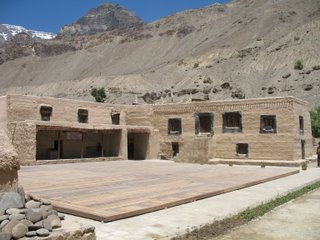We have come down from the higher parts of the Himalayas to re-group. We're in a touristy town called Manali to get some supplies, eat some more varied food than noodle soup and Tibetan bread (like pita bread) and to catch up on communications via the Internet. That last task has become something of an indespensible activity since we've been on the road. It used to be that a backpacker's only access to news about the world came in the form of a few abbreviated, international publications such as the
International Herald Tribune (published by the New York Times),
Time magazine or its British equivalent,
The Economist. These were expensive, limited in scope and tough to find.
Now, via the World Wide Web, I can and do get all same the news I read when I was in the U.S. I can't tell you how much more connected I feel out here because I can track news and issues I care about. Even when I was at home, most of the news I read came from the Internet. In the last ten years, I have grown so suspect of the agenda of "corporate owned" media that I sought out more balanced coverage from other sources. The web-link to one of those sources,
Democracy Now!, is to the right of this text. I get a daily news summary from them every weekday.
In two recent articles, I was sickened to read about the introduction of a bill (the
COPE - Communications Opportunity, Promotion and Enhancement Act) into the US Congress aimed at controlling content on the Internet. The bill has already passed the House of Representatives. They debated and passed it late at night to minimize media exposure. You can read the full articles here: (
first article,
second article). In a nutshell, the major telecommunications companies, those who supply
all of us with Internet access, have lobbied Congress to allow them to have more control over the quality and cost of access. If their effort at re-writing the regulations succeeds, these companies will have the ability to limit the expression of anyone who wants to read, write, advertise, sell or otherwise communicate without censorship to anyone else via the Web.
The Internet was originally set up to be "neutral". In other words, anyone who set up a web site would be allowed the same speed and accessibility as any other web site at the same cost. Your corner video shop could offer access to their web site as easily and quickly as Microsoft could offer you access to theirs. Under the proposed bill, AT&T or Comcast or Cox cable companies or any Internet "provider" would be able to go to a company with a "rate card" offering differing levels of service at different costs. This is the same setup as those currently employed by television and radio stations (you pay more for prime time, less for middle of the night) or newspapers (you pay more for more space and better page placement, less if your ad is tiny or buried.) If you can't afford what a big company can, the "provider" could relegate you to a super-slow connection rendering your site too frustrating for people to use.
What's worse, if you have a message that the "provider" disagrees with, they can block your site or slow it down. Heaven help the Democrats or any other political party who wants to raise money or disseminate information for elections. If the company doesn't agree with your point of view, they will have authority to block your site or slow down access. This is not far-fetched. Companies have already limited access in such underhanded ways as (see
link):
- In 2004, North Carolina ISP Madison River blocked their DSL customers from using any rival Web-based phone service.
- In 2005, Canada's telephone giant Telus blocked customers from visiting a Web site sympathetic to the Telecommunications Workers Union during a contentious labor dispute.
- Shaw, a major Canadian cable, internet, and telephone service company, intentionally downgrades the "quality and reliability" of competing Internet-phone services that their customers might choose -- driving customers to their own phone services not through better services, but by rigging the marketplace.
- In April, Time Warner's AOL blocked all emails that mentioned www.dearaol.com -- an advocacy campaign opposing the company's pay-to-send e-mail scheme.The telecom companies are trying to plunder something they had no hand or interest in creating. Here is a quote from one Congressmember (Ed Markeky - Democrat of MA - speaking on the House floor, June 8th, 2006.):
CONGRESSMAN MARKEY: Let me just make this point once again. The Bell companies had nothing to do with the creation of the Internet. The Bell companies had nothing to do with the development of the World Wide Web. The Bell companies had nothing to do with the browser and its development. In fact, AT&T was asked if they wanted to build the Internet, the packet-switched network in 1966. They turned the contract down when the government went to them. And so a company named BB&N, Bolt, Beranek, & Newman got the contract, a very small company -- not AT&T. They had nothing to do with the development of the Internet, but now, at this late date, they want to come in and to create these bottleneck control points that allow them to extract Internet taxes, Internet fees from companies and individuals who have been using the Internet for a generation. It is this absence of non-discriminatory language in the Manager’s Amendment and in the bill to which I object.In the US we have four major TV networks all owned and controlled by very large, multinational corporations. Radio and newspaper ownership is similarly consolidated. You can go to this site to see who owns what:
link. In my lifetime I have seen the corporate media become a unquestioning lap dog for the Government and big business. The Internet finally allowed some diversity. It will be a huge step backword if this bill is allowed to pass as-is. See this website:
http://www.savetheinternet.com. Contact your Congressperson and Senators and tell them to keep the telecom companies' hands off the Internet.
e-mail: For Senators go to
www.senate.gov/contacting/index_by_state_cfm.cfm for Representatives, go to
www.house.gov/writerep/Here is a link with other steps you can take:
http://www.savetheinternet.com/=act





